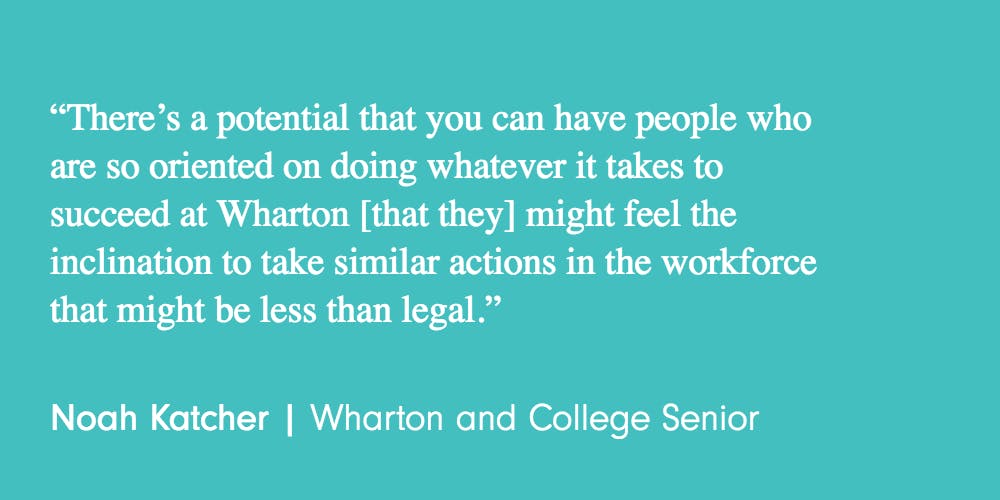Anna Schmitt (C, W’19) recounts an instance from Management 104 during a lecture about the collapse of a factory in Bangladesh that killed over a thousand workers in 2013. A student raised their hand and said something to the effect of: “it’s okay to have these working conditions abroad because people there need employment and we’re increasing shareholder value here.” Anna says that students accepted that comment without question.
Penn alumni are undoubtedly successful. This year’s Forbes’ annual 30 under 30 lists, which recognized 600 young entrepreneurs in various fields, included twenty-six Penn graduates – the fifth most alumni from any university. Penn prides itself on producing countless billionaires, for its professors who conduct the latest groundbreaking research, and for one of the country’s best business schools: Wharton. Sixteen alums out of the 26 listed on Forbes graduated from Wharton.
But what Penn doesn’t celebrate are alum Jho Low’s financial laundering and schemes in Malaysia, President Donald Trump’s “legally dubious” financial actions regarding tax payments, and numerous alumni charges of insider trading, like Woojae “Steve” Jung, Rajiv Goel, and Raj Rajaratnam.
Does a dogged focus on profits undermine the seriousness of ethical teachings and exacerbate Wharton’s already hyper–competitive culture? How does a historically privileged institution like Wharton address important ethical topics like inclusion and diversity? What are the implications of shoving diversity and ethics to the side? These are questions that Penn, and specifically Wharton, doesn’t like to talk about.

“People will justify anything based on the fact that you have to increase your shareholder value. This never gets questioned and I've never felt like I've been in a class where we’ve really dug down into what this means for society.” Anna says.
Through its new curriculum, Wharton aims to allow students entering in the fall of 2017 and beyond to enjoy “increased flexibility for students to more deeply pursue areas of individual interest, a doubling of leadership content, and greater emphasis on innovation and technology, ethics and social values, and the global economy,” Wharton’s Senior Director of Academic and Student Affairs Scott Romeika wrote in a statement.
Specifically, students are now required to take at least one course in Legal Studies and Business Ethics (LGST 100 or LGST 101). Romeika said these two required courses “elevate” the previous curriculum to explore “the role of social values in business decision making and strategy, from legal and philosophical perspectives, respectively.”
But oftentimes, Anna says, students view these courses as “fluffy” and unimportant, and the classes often lack discussion and fail to address what is morally correct and what is not.
Rei Fujita (W’19) says that since morally questionable actions are often legal, “Wharton doesn’t really emphasize that you should take the moral path.”

“A lot of people who are in Wharton will be on the non—moral side that increases profits,” Rei says. “Inherently, they see nothing wrong with it because it’s not like we’re taught that it’s wrong.”
Anna says that in most of her Wharton classes, there is rarely ever room for discourse. Ethics is “completely removed” from many courses outside of the Legal Studies and Business Ethics department, even where ethics principles may be relevant and necessary. “We never talk about what [our actions] mean for people,” she says.
Nina Strohminger and David Zaring, professors in the Legal Studies and Business Ethics department, say that courses outside of the department vary in how they teach students about the ethical implications of course material.
"The faculty has a lot of leeway, not infinite, but a lot of leeway,” Strohminger says. “That's why if you look at the syllabi, you find that although there's some overlap, there's a lot of differences… [There] are very different ways on approaching this topic, and depending on which section you enroll in, you'll get very different perspectives."
Similarly, Zaring says that there are departments where ethics aren’t “really part of the teaching curricula… and places where it is something that comes up inevitably depending on the kind of subject matter being studied.” For example, topics regarding ethics aren’t always a “critical component” of finance courses.

Noah Katcher (C, W ‘19) says that a good ethical foundation is important for students who want to go into business and finance. “There is theory behind ethics and there is research behind it and there's a reason that this form of research has flourished as much as it has."
Perhaps the competitive nature of Wharton, not just its curriculum, desensitizes students to the ethical consequences of their actions, both at school and in the workforce. In 2016, Wharton’s highest-rated professor Adam Grant was quoted in the Daily Pennsylvanian criticizing Penn’s hyper–competitive culture. “I’ve been at five universities — this is by far the worst I have ever seen it. The way it is at Penn is far, far, far more damaging than at Harvard [University], or [University of] Michigan, or [University of North Carolina at Chapel Hill].”
Ironically, a course he teaches is “unusually competitive” to get into.
Noah says this competitive atmosphere often drives “people to where they’re so used to doing whatever it takes to achieve the best possible results at little to no penalty.” In school, the stakes are limited: they might get caught cheating. Worst case, they fail the class. But “there's a potential that you can have people who are so oriented on doing whatever it takes to succeed at Wharton [that they] might feel the inclination to take similar actions in the workforce that might be less than legal.”
In addition to its competitive environment, a lack of socioeconomic and racial diversity may be another factor contributing to Wharton’s ethical blind spots, since students might not experience a range of perspectives on inclusion and diversity. "The kinds of viewpoints we get [in Wharton] are from people who are more privileged and who also expect to continue to be privileged in the future,” Anna says. “Not everyone feels hindered in the workplace so it's good for them to learn how they can help other people… and it's really hard to hear other voices when the majority of the people in your class are really rich."
According to a recent New York Times report, 71 percent of Penn students come from the top 20 percent in terms of median family income. And Wharton struggles with racial diversity issues too. Ekunda Wonodi (W’ 19), a black woman, is involved in cultural organizations on campus like contemporary West African dance group African Vibes and traditional dance group African Rhythms, and says that “when I’m not in these groups, I do feel like I'm in a different space and I do have to navigate things a little bit differently […] It's very quick that I walk into a room and I’m like, ‘I'm probably the only black person here.’”

In the Legal Studies and Business Ethics department, teaching about socioeconomic and racial diversity is meant to expose students to all possible situations they might run into. “The whole point is inclusion. We want the students to buy in and think carefully about these issues,” Zaring says. But courses in the department often are not required. Even with Wharton’s curriculum change, Management 104—the course that focuses on industrial relations, human resources, and diversity in the workplace—is not required.
Ekunda says that discussions of diversity outside of Management 104 and the Legal Studies and Ethics department do not occur often, and when they do, they are “very removed.” Oftentimes, students don’t consider how diversity is affecting others on campus. “It's like a separate issue that's in its own vacuum.”
Ekunda says Wharton teachers and students often bring up the fact that diversity in the workplace also generates profits for companies in the long run. "While it's a good reason to include diversity because you perform better, that shouldn't be the reason you want to improve the diversity of your organization,” she says. “It shouldn't all be entirely driven by profits."
On the contrary, Maria Curry (C, W ‘19), also a black woman, believes that any form of action that fosters diversity is beneficial, even though intentions might be economically—based. However, she agrees with Ekunda on the perspective that Wharton professors and students “avoid talking about diversity” because of the sensitivity of the topic.
“I don't like the idea that we avoid talking about diversity because it makes white people feel uncomfortable,” Rei says. “But I feel like that's literally how it is.” Rei says that not talking about these topics hinders important questions of ethical behavior and inclusion in the workforce.
Integrating ethics and diversity in the Wharton curriculum, and Penn curricula in general, won’t fix the problem, though Anna says that Wharton should work with the ethics department and integrate these topics into each course curriculum.
Zaring says that although he has had conversations about building a finance course that incorporates legal studies, they have been “preliminary… It takes some doing to get a new course started and a real vision about how exactly it's going to work.”
Some Wharton students, like Rei and Anna, believe these problems exist in the wider Penn student body, where intense competition and pre–professionalism proliferate. Careers in finance and consulting are desirable among those in the College and Engineering, where ethics courses also lack.
Rei says it’s interesting how all the other colleges “hate” on Wharton but are doing the exact same things, such as “trying to take Wharton classes and getting sucked into the Wharton culture anyway… Now it’s not only the Whartonites that are morally questionable.”
Allison Wu is a freshman in the College from Palo Alto, California. She is a features staff writer for Street.
